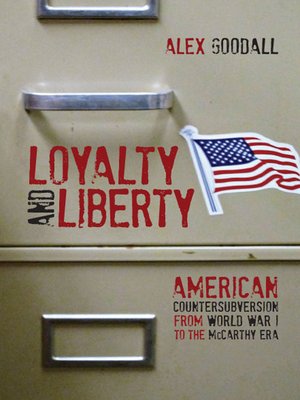Loyalty and Liberty
ebook ∣ American Countersubversion from World War 1 to the McCarthy Era
By Alex Goodall

Sign up to save your library
With an OverDrive account, you can save your favorite libraries for at-a-glance information about availability. Find out more about OverDrive accounts.
Find this title in Libby, the library reading app by OverDrive.



Search for a digital library with this title
Title found at these libraries:
| Library Name | Distance |
|---|---|
| Loading... |
Identifying varied interest groups such as business tycoons, Christian denominations, and Southern Democrats, Goodall demonstrates how countersubversive politics was far from unified: groups often pursued clashing aims while struggling to balance the competing pulls of loyalty to the nation and liberty of thought, speech, and action. Meanwhile, the federal government pursued its own course, which alternately converged with and diverged from the paths followed by private organizations. By the end of World War II, alliances on the left and right had largely consolidated into the form they would keep during the Cold War. Anticommunists on the right worked to rein in the supposedly dictatorial ambitions of the Roosevelt administration, while New Deal liberals divided into several camps: the Popular Front, civil liberties activists, and embryonic Cold Warriors who struggled with how to respond to communist espionage in Washington and communist influence in politics more broadly.
Rigorous in its scholarship yet accessible to a wide audience, Goodall's masterful study shows how opposition to radicalism became a defining ideological question of American life.
| Cover Title Page Contents Acknowledgments Introduction PART I: THE REVOLUTIONARY CHALLENGE 1. Policing Politics 2. War and Peace 3. Red Scare PART II: PROFESSIONAL PATRIOTS 4. Divided Loyalties 5. Red Herrings 6. Subversive Capitalism 7. Troubled Spirits PART III: THE NEW ANTICOMMUNISM 8. American Fascism 9. A Mirror Image 10. The Big Truth Conclusion Notes Bibliography Index | A Choice Outstanding Academic Title, 2014. — A Choice Outstanding Academic Title, 2014.|Alex Goodall is a lecturer in modern history at the University of York, where he specializes in the history of revolutionary and counterrevolutionary politics in the Americas.







